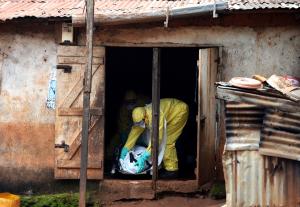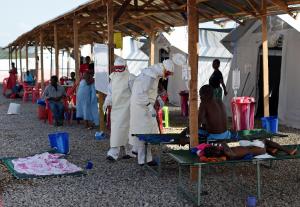Paris (AFP) - Congolese expert Jean-Jacques Muyembe may be little known to the public, but he has been one of the world's top Ebola investigators since the first epidemic erupted in central Africa in 1976.
Now, amid a decline in a west African outbreak that has taken more than 11,000 lives, Muyembe warns that Ebola will strike again in the future and that the deadly virus poses "a threat to the whole world".
Muyembe studied medicine in Kinshasa and at the University of Leuven in Belgium. He returned home to the Democratic Republic of Congo -- then known as Zaire -- in 1976, when the northern village of Yambuku was struck by a mysterious disease."They said many people were dying, and the health ministry asked me to go investigate," Muyembe told AFP.
He initially thought it could be a case of typhoid fever but he decided to continue investigating until he got to the bottom of it.
"I drew blood, and had no protective gloves or clothing," Muyembe said.
Accompanied by a Belgian nun suffering from fever, he returned from Yambuku to Kinshasa.
It was her blood samples, shipped in a makeshift cooler to the Institute of Tropical Medicine in Antwerp, that enabled scientist Peter Piot to identify the worm-looking virus for the first time.
It was then named after the Ebola river, located near the area first hit by the epidemic.
"Then there was total silence until 1995," Muyembe said.
That year, he was summoned to Tikwit in the south of DR Congo where a bloody diarrhoea outbreak was decimating the population, including medical staff.
"I examined an Italian nun and saw signs that reminded me of the Yambuku incident," Muyembe said.
He discovered that contamination "had taken place in the operation room -- in other words, from the patient's blood".
Muyembe's discovery that the virus is transmitted through bodily fluids was a key find.
"From then on, we put in place strategies to fight against the disease, isolating patients, following up on people they had been in contact with, and mobilising communities," he said.
"These are strategies that the World Health Organization practises today."
Professor Muyembe's team then started testing serotherapy on patients.
"We drew blood from people recovering from Ebola, and injected it into eight sick patients. Seven of them survived, even though there was an 80 percent mortality rate," he said.
This type of treatment is now being studied for its potential.
- 'Ebola can strike anywhere' -
Even after decades fighting the deadly virus, Muyembe said he was "surprised" by the sheer size of the resurgence in Guinea in late 2013.
"We thought Ebola epidemics could be brought under control quickly," he said.
Previously, DR Congo had successfully put an end to seven epidemics.
"These countries (in west Africa) believed that Ebola was a central and eastern African problem. They weren't prepared," he added.
The epidemic has now ended in Liberia, and is declining in Sierra Leone.
But in Guinea, "new cases continue to appear", Muyembe said.
"We need to find the most recent cases, even if they are hidden deep in the forest, because if the disease becomes endemic, it would be terrible for the whole world," he warned.
"In 10 or 20 years' time, this epidemic will return, and we need to be prepared," he said.
"Ebola can strike anywhere, and we need to be vigilant. The United States and Europe must understand that Africa is their shield."
This year's winner of the prestigious Christophe Merieux award for researchers studying infectious diseases in developing countries, Muyembe sees the 500,000 euros ($550,000) in prize money as a "boost" to help him study Ebola reservoir hosts.
"Monkeys, bats, we aren't certain," he said.
Muyembe also sees the prize as a way to encourage young Africans studying abroad to return to work.
"I have made my career in DR Congo, despite all the conflicts my country has known," the researcher said.
"We must build up labs and research centres in Africa," he added, "so that when the danger arrives, we can stop it in time. This is the lesson we must learn from this epidemic."
http://news.yahoo.com/ebola-return-veteran-scientist-warns-054808070.html
10 Items to Always Buy in Large Quantities
Despite the obvious discounts that come from buying items in bulk, doing so is not always a smart move. That’s because purchasing too much, even of a good thing, can lead to waste and clutter. There are some cases, though, where buying a lot of something at once can actually be a good move for your wallet. Here are 10 items to buy in large quantities:
1. Toilet paper
Buying this essential paper product in bulk can be up to 50 percent cheaper than buying a few rolls at a time. So find a place to store some extra toilet paper (try under your bed if you run out of cupboard space in the bathroom) and save yourself a few bucks. Just make sure you always store it in the same place, so you know where it is and don’t buy even more when you’re already fully stocked.
2. Soap and shampoo
Buying these items in bulk saves a few cents an ounce on shampoo or per bar of soap. While this may not seem like very much, it adds up over time. Since you know from your washing habits how often you need to replenish your supplies — perhaps you go through one bottle per month — you can easily buy a few containers at once in advance to score the discount.
3. Office supplies
The next time you need office supplies such as pens, folders or staples, be sure to buy them in bulk. Doing so can save you up to 50 percent off the price you would have paid if you didn’t buy in bulk. Whether you compare prices online at big office supply stores or prefer to visit the grocery store or discount store in person and stroll through the aisles, you can usually get a better deal by stocking up on items you know you’ll need — and use.
4. Toothbrushes and toothpaste
If you practice good dental hygiene, and we hope you do, then you purchase new toothbrushes and toothpaste every few months (or at least you should). You could either buy two toothbrushes for $8 or six for $14. Similarly, you could buy a tube of toothpaste for $5 or get three for $10. If you’re buying for your whole family, then the available savings are even bigger.
5. Vitamins
Spending money in the name of health is always a good idea; be sure to read up on the latest recommendations to pick the vitamins that provide the biggest benefit. You can save a few cents per pill by buying in bulk. Again, this may not seem like much, but over time, the savings add up.
6. Pantry items
When it comes to buying food items that will not perish quickly, such as cereal, canned tuna or soft drinks, opt to buy in bulk. Doing so is typically 30 percent cheaper than just buying one box, can or drink at a time. Just be sure to stick with items that have a long shelf life to reduce the chance the items go to waste. Paper towels, cotton swabs and cereal are all among the most popular items purchased through Amazon Prime Pantry, which can offer lower prices than brick-and-mortar stores when multiple items are purchased at once.
7. Coffee
Whether you grind your own beans or use K-cups, purchasing coffee in bulk can significantly reduce the costs of your caffeine habit. Signing up for automatic delivery through a monthly delivery service also ensures you’re never out of your morning pick-me-up.
8. Diapers
If you have babies in the house, then you’re probably constantly buying diapers. Save yourself some cash by using Amazon Subscribe & Save or a similar service to keep yourself well-stocked while benefiting from discounts.
9. Batteries
You don’t want to notice you’re all out of batteries when the lights go out and you can’t find a working flashlight. Stock up on batteries by buying large packages of them to get the best deal and also make sure you don’t run out at key moments.
10. Detergent
Everyone does laundry, and there is no way to get around it. By spending a little more to get a huge tub of detergent instead of a smaller one, you can save up to 17 cents a load. So when it comes to laundry detergent, always reach for the larger container.
http://wtop.com/consumer-news/2015/05/10-items-to-always-buy-in-large-quantities/



No comments:
Post a Comment